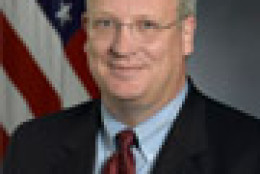Cybersecurity
-
The Defense Information Systems Agency launches reorganization, including the new Joint Task Force-DoD Information Networks. The new cyber organization will reach initial operating capability on Jan. 15, taking over 14-to-19 tasks from U.S. Cyber Command.
January 13, 2015 -
The Office of Personnel Management disabled a Web portal used by federal retirees Monday to address a malfunction that may have left some retirees' personal information exposed.
January 12, 2015 -
The 2015 budget came with more than money for federal agencies. You got some homework, too. Namely 15 Cross-Agency Priority (CAP) goals important to the White House. They cover everything from cybersecurity to climate change. Brenna Isman is a project director at the National Academy of Public Administration. She joined Tom Temin on the Federal Drive to discuss some of the CAP goals agencies will be working toward over the next year or so.
January 12, 2015 -
Before leaving office, Sen. Tom Coburn (R-Okla.) released a thorough study of the cybersecurity mission at the Homeland Security Department. Coburn says DHS is struggling to protect federal networks from intrusion. And he says its efforts at working with the private sector on cyber protection are sketchy. Melissa Hathaway, president of Hathaway Global Strategies, a former director of the Joint Interagency Cyber Task Force during the Bush Administration and a member of the National Security Council for President Barack Obama, joined Tom Temin on the Federal Drive with reaction and some ideas for where DHS should go next.
January 12, 2015 -
Continuing the break with State of the Union tradition, President Barack Obama will spend most of the coming week previewing more of the proposals he will outline in the address, including on identity theft, electronic privacy and cybersecurity, the White House announced Saturday.
January 12, 2015 -
Cyber attacks come in three different flavors, at least when it comes to figuring out who's behind the attack. That's according to Jay Healey -- he's director of Cyber Statecraft Initiative at the Atlantic Council. On In Depth with Francis Rose, he explained the three flavors of cyber attribution.
January 09, 2015 -
Congressman Elijah Cummings wants KeyPoint Government Solutions to provide him with a briefing and answers to 13 questions about the December cyber vulnerability that put more than 48,000 federal employees at a greater risk of identity theft.
January 07, 2015 -
Air Force CIO Lt. Gen. Bill Bender said the service is baking in role-based authentication capabilities as part of its move to the MilCloud. He said the Joint Regional Security Stacks (JRSS) will help the Air Force move out of its AFNet architecture.
January 07, 2015 -
Agencies should consider these six steps to help keep their employees safe and informed during emergencies, says Aviv Siegel, the CTO and co-founder of AtHoc, in a new commentary for Federal News Radio.
January 07, 2015 -
Disability fraud and deceased benefit fraud are two of the biggest threats to the integrity of the Social Security Administration, according to the agency's Inspector General. Patrick O'Carroll says preventing those types of fraud before they start is his number one priority this year. He shared his Top 3 for 2015 on In Depth with Francis Rose. He tells Federal News Radio's Sean McCalley how his office plans to meet its goal.
January 06, 2015 -
The insider threat will be more in focus in 2015, according to many of the cyber experts we talked to for this year's Top 3 for 2015. But the insider threat isn't always someone -- or some people -- intentionally doing bad things to hurt your organization. Mischel Kwon is president of Mischel Kwon Associates, and former director of the United States Computer Emergency Readiness Team at the Department of Homeland Security. She shared her Top 3 for 2015 on In Depth with Francis Rose. Kwon says "nerd wars" are the fastest growing form of insider threat.
January 06, 2015 -
CyberCompEx. It sounds like a new medicine. Actually it's a social network site just for cybersecurity people in and out of government. The Homeland Security Department's Research and Development Division recently announced CyberCompEx. Developed in conjunction with Monster Government Solutions, CyberCompEx will serve as a portal for students, professionals, employers and others interested in the cybersecurity. Karen Evans is the National Director of U.S. Cyber Challenge and one of the architects of the site. She joined Tom Temin on the Federal Drive to discuss the new site.
January 05, 2015 -
That September cyber breach affected more current and former Postal employees than the 800,000 first reported.
January 05, 2015 -
As Congress comes back next week, the Defense Department expects to make a huge push to end sequestration -- or at least blunt its effects. Part of the case the Pentagon will make is that its "cost culture" strategy is making a difference in how it's spending the money it does have. Dave Wennergren is Senior Vice President for Technology at the Professional Services Council, and former Assistant Deputy Chief Management Officer at the Defense Department. He shared his Top 3 for 2015 on In Depth with Francis Rose. He said that cost culture will spread from the Pentagon to all across government.
January 02, 2015 -
A data breach at the Department of Veterans Affairs is the latest in the long line of cyber events in the Federal government. Jane Holl Lute is President and Chief Executive Officer of the Council on Cybersecurity, and former Deputy Secretary of the Homeland Security Department. In her Top 3 for 2015, she writes low cost, basic cybersecurity prevents 80 percent to 90 percent of all known attacks. On In Depth with Francis Rose, she explained whether or not she's confident that equation will stay the same this year since incentives for the bad guys will continue to grow.
December 30, 2014











